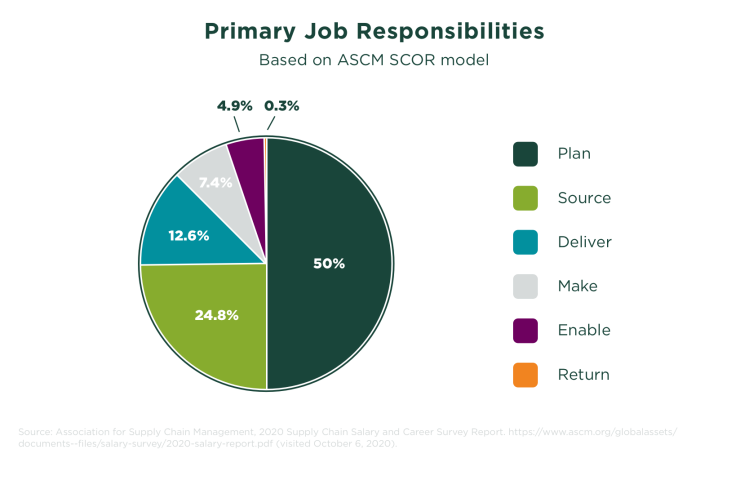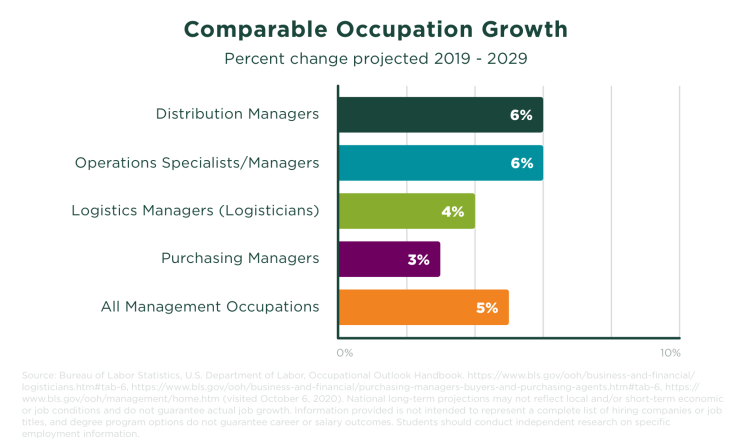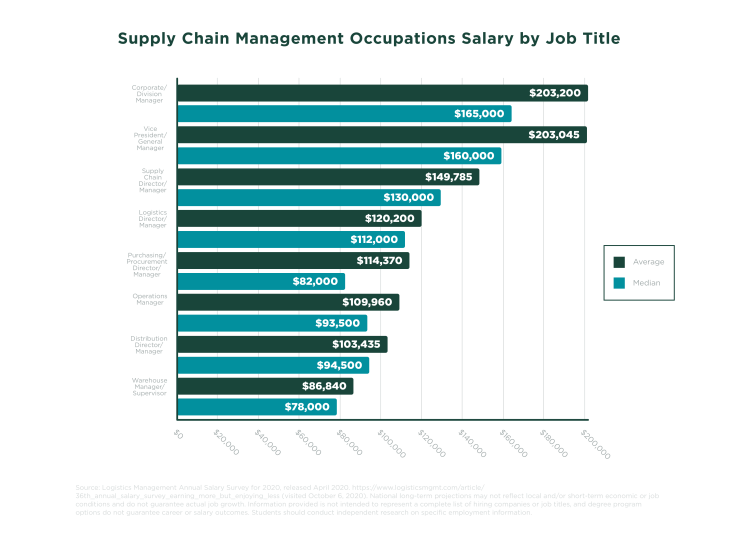4 Reasons Why to Choose a Supply Chain Management Career
Last Updated October 21, 2020

Market conditions, disruptive global events and advancements in technology can all lead to corporate contraction and even job elimination or replacement that results in career disruption. The field of supply chain management is no different. While technological innovations have led to new career opportunities and capabilities within the supply chain, the COVID-19 pandemic has greatly impacted the global supply chain of nearly every industry.
Although the way customers purchase – and even receive – their supplies and services has changed drastically, just in the course of 2020, and continues to evolve as more work, events and purchases take place online, the need for savvy supply chain professionals to oversee the intricacies of moving a product or service from inception to purchase hasn’t abated and will only grow more complex.
Here are four reasons why supply chain management could be a good career choice for you:
1. Supply Chain Management Career Variety
Supply chain management is a broad umbrella term that includes many roles and functional areas, including operations, purchasing, warehousing, distribution and logistics. That means a career in supply chain management can lead you down a variety of different career paths. The needs and diversity of roles can also depend on the industry, as every industry is a little different when it comes to the day-to-day responsibilities of a supply chain professional.
Common job titles include:
- Purchasing Agent
- Purchasing Manager
- Operations Manager
- Logistics Analyst
- Logistics Manager
- Distribution Manager
- Supply Chain Manager
This variety of roles and job titles means a variety in daily job responsibilities, the types of tasks you’ll execute and the skills and knowledge you’ll need to apply on the job. In the 2020 Supply Chain Salary and Career Survey Report from the Association for Supply Chain Management (ASCM), respondents were asked to identify their primary responsibility based on functions outlined in the ASCM Supply Chain Operations Reference (SCOR) model. Half of the respondents denoted some element of “plan” as their primary responsibility.

2. Supply Chain Management Job Growth
“If inventory is the lifeblood of supply chains, labor is the nervous system,” writes Patrick Burnson for Logistics Management. “Heading into 2020, the overall labor market was positive, with low unemployment and an increase in median wage. The bad news: job creation has been concentrated in low- to mid-paying jobs and labor force participation is relatively low.”
This is reflected in the U.S. Bureau of Labor Statistics projected growth rates for several management roles within the supply chain area, with several hovering around an “average” growth outlook comparable with all management occupations across industries.

Then, there’s the impact of 2020 itself on the economy. Forces like the COVID-19 crisis, ongoing technological advances, responses to climate change, globalization and the shifts in global power and influence impacting trade and commerce all have “implications for the entire planet, as the world [faces] 2020 with the greatest upheaval in international relationships since WWII,” asses researchers for “Transformation Age: Shaping Your Future,” study, the third Roadmap Series publication by MHI, the nation’s largest material handling, logistics and supply chain association.
The publication details how these “mega trends and game-changing events” within the global marketplace have the potential to ignite supply chain transformation and “create a pathway for opportunity,” particularly “for material handling and logistics as market trends generate increased demand for both domestic and international supply chain enhancements…”
Echoes Courtney Rogerson, senior principal analyst at Gartner: “What the pandemic has reminded us is how critical supply chain and logistics are at the foundational level. While the growth of digital business holds the promise of innovation, optimization, and new products and services, physical goods can’t reach their destination without physical assets to get them there…logistics has become a strategic differentiator.”
3. Supply Chain Management Salaries
As these new opportunities are created and the role of supply chain and logistics becomes ever more critical, the demand and competition for top talent to serve as strategic leaders is likely to increase, resulting in competitive salaries, especially in roles at the manager-and-higher levels.
In reflecting on the findings of Logistics Management’s Annual Salary Survey for 2020, released in April 2020, Patrick Burnson writes that “researchers were heartened to see that logistics salaries for early 2020 increased precipitously over 2019 figures.”
The 2020 Supply Chain Salary and Career Survey Report from ASCM showed a similar bright outlook for supply chain salaries. In fact, supply chain professionals holding at least a bachelor’s degree reported a median salary of $78,750, according to ASCM’s Survey Report. That is a figure 24% higher than the national median salary.
That earnings potential in supply chain increases as you ascend the professional ladder, with six-figure salaries not uncommon for those in a managerial or higher role.

While salaries for supply chain positions are already highly competitive, compensation above and beyond a base salary is the norm, with 91% of respondents to ASCM’s Survey Report saying they received some form of bonus, profit sharing, or other form of additional cash compensation.
4. Supply Chain Management Career Advancement
Within the supply chain, there are ample opportunities to move from entry level roles, to management, to director-level positions. At larger organizations, there may also be opportunities for VP-level roles or specific product line ownership.
Entry level supply chain jobs often allow early-career professionals to survey the company and industry as they work with many departments, including finance, sales, research and development, marketing, engineering, and quality in entry level roles like planners, buyers or supply chain analysts.
When it comes to taking the steps needed for career advancement, 45% of respondents in the Logistics Management Annual Salary Survey for 2020 indicated that continuing their education, either through training classes or completing a degree program, “have been the most important steps in advancing [their] career.” Degrees in business, finance, management, transportation, logistics or supply chain were the most common programs/courses reported by this group.

Advancing your education as you advance in your career can add up, as gaining in experience, education, and professional certifications can all influence salary. ASCM’s Survey Report indicates that supply chain professionals with a graduate degree or higher earned a median salary of $95,750. Ultimately, your background and career goals can help you determine the right program you need for your supply chain management career, whether that be a certificate program or a degree program.
With a variety of areas and specialties in which to pursue a career, higher than average salaries, and opportunities for advancement and career growth, supply chain management is an area poised to evolve and transform with the challenges of these unprecedented times.
Are You Ready to Lead the Supply Chain Transformation?

